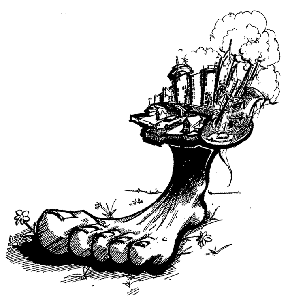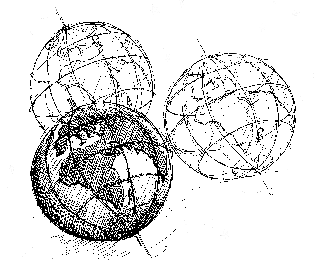

Ecological Footprint Concepts (In a nutshell)
People depend on nature for the supply of food, energy and fiber, the absorption of waste products and other life-support services. If we are to continue to have good living conditions, we must ensure that nature's productivity isn't used
Our Ecological Footprint
"The first step toward reducing our ecological impact is to recognize that the "environmental crisis" is less an environmental and technical problem than it is a behavioral and social one."
-William Rees, from the Preface of "Our Ecological Footprint, Reducing Human Impact on the Earth"
more quickly than it can be renewed, and that waste isn't discharged more quickly than nature can absorb it. To find out whether nature provides enough resources to secure good living conditions, the Task Force on Healthy and Sustainable Communities at the University of British Columbia has developed an ecological accounting tool: the ecological footprint. The ecological footprint is an accounting tool for ecological resources. Categories of human consumption are translated into areas of productive land required to provide resources and assimilate waste products. The ecological footprint is a measure of how sustainable our life-styles are.
Can everybody on earth live like the average North-American today?
No. In fact, if everyone on earth lived like the average North American, it would require at least three earths to provide all the material and energy she or he currently uses. Preliminary estimates show that the ecological footprint of today's consumption in food, forestry products and fossil fuels alone might already exceed global carrying capacity by roughly 30%. About 3/4 of the current consumption goes to the 1.1 billion people who live in affluence, while 1/4 of the consumption remains for the other 4.6 billion people. This demonstrates the ethical implications of the sustainability dilemma and questions economic expansionism as a remedy for poverty.
What are the means of nature?
People are a part of nature and depend on its supply of food, water, energy, fiber, waste sinks, and life-support services. Sustainability requires us to respect this fact. It implies that we cannot turn our resources into waste faster than nature can turn waste back into resources. It also recognizes that worsening ecological conditions ultimately threaten everyone's well-being—no matter how well they live temporarily while overspending nature's budget. Sustainability means coming to grips with what it takes to satisfy us, and the real costs.
CARRYING CAPACITY (please read to further your understanding of "carrying capacity")
http://dieoff.org/page110.htm
There is a creative tension between these two goals: staying within the capacity of natural capital and securing satisfying lives for all, now and in the future.
When that creative tension is viewed as limiting, unacceptable, and unfair, humanity turns down the more destructive path. When that tension is seen as the source of dynamic energy, humans can redefine their lives and make choices that enhance sustainability.
This definition of sustainability is simple and specific.
It's also measurable. The extent to which we're using nature's interest can be measured with resource accounting and ecological assessments. (There are also a number of ways to measure the degree to which we're satisfied with our lives). In fact, we can obtain specific targets that allow us to judge the effectiveness of our actions.
Sustainability Clarified: Satisfying lives for all within the means of nature—now and in the future.
What about the economy?
Some might argue that this definition of sustainability leaves out an important third element, the economy. Yet it doesn't. The economy is where all the action happens, the balancing of human needs and desires and the material reality of what nature can provide. Economic performance is not a separate thing, nor a goal in itself. Redefining Progress' Genuine Progress Indicator, an alternative economic indicator, critiques the standard use of the Gross Domestic Product (GDP) to measure so-called progress and suggests alternative paths.
A simple idea, a tall order.
While defining sustainability is fairly straightforward, trying to make the world sustainable can be frustrating and confusing at times. This can make the task look monumental, if not impossible. Moreover, it can seem ominous, since these basic truths challenge us and make us question how we organize our lives and what we need to feel satisfied. It can seem threatening—even though the end goal of sustainability is to secure our well-being. Is it possible to organize our economy in such a way that it serves the ultimate end—satisfying lives for all, now and in the future—without destroying our ultimate means: nature's capacity for renewal?
Ever wondered how much "nature" your lifestyle requires?
You're about to find out. "The Ecological Footprint Quiz" estimates how much productive land and water you need to support what you use and what you discard. After answering 13 easy questions you'll be able to compare your Ecological Footprint to what other people use around the world and to what is available on this planet.
Click below to access the quiz. We will use this quiz as the basis for discussion on the WebBoard.
Calculating Your Ecological Footprint
http://www.myfootprint.org/
(At the website. click on the United States and scroll over to English to go to the quiz.)By William E. Rees, The University of British Columbia

Home![]() Introduction
Introduction ![]() Writing Papers
Writing Papers ![]() Readings
Readings ![]() Schedule
Schedule ![]() Assignments
Assignments
![]() Journals
Journals ![]() Final Project
Final Project ![]() Field Trips
Field Trips![]() Rubrics
Rubrics ![]() Links
Links
|
©
FGCU 2006. This is Website
designed by |
|
Florida Gulf Coast University 10501 FGCU Blvd. South Fort Myers, Florida 33965 |